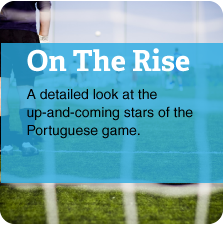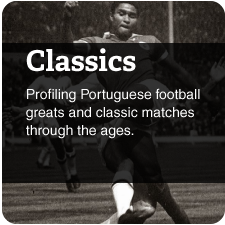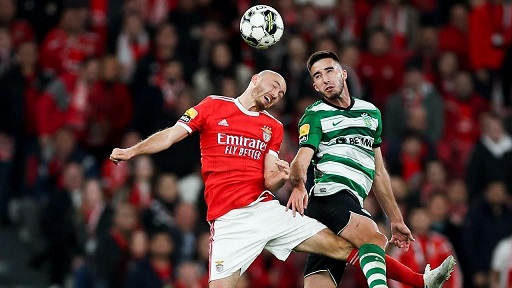 The first week of April promises to be a crunch week in the domestic season in Portugal as Lisbon giants Benfica and Sporting go head-to-head twice in five days.
The first week of April promises to be a crunch week in the domestic season in Portugal as Lisbon giants Benfica and Sporting go head-to-head twice in five days.
On Tuesday 2 April a berth in the Portuguese Cup final will be decided with the second leg of the semi-final at the Estádio da Luz. Sporting lead 2-1 from the first leg.
Then on Saturday 6 April, the Estádio José Alvalade will be the scene of potentially the 2023/24 Portuguese Liga title decider as Sporting host their rivals from down the road.
You can find on this site plenty of information about which way the matches will go, and PortuGOAL.net will be reporting extensively on the keenly anticipated double-header.
The eternal derby
They are two massive games with lots of stake, but that has always been the case going back a century in a fixture known at “the eternal derby” in the Portuguese football calendar. Irrespective of the ups and downs that each club may be experiencing, the fierce nature of the rivalry means that when the two sides meet, the city stops for 90 minutes as both sets of players desperately try and get the result that will confer their supporters the local bragging rights.
Getting football predictions correct is an extremely tricky task at the best of times given the unpredictable nature of the sport, and the historical record between the two teams shows this to be very much the case for the Lisbon derby. It has been played a total of 320 times since the first encounter in 1907, with Benfica winning 139 games (43%), Sporting 113 (35%) and 68 draws.
The Eagles enjoyed an initial period of significant dominance, winning 15 of the first 21 meetings between the sides, with Sporting only experiencing the sweet taste of victory three times in this period.
Peyroteo puts Benfica to the sword
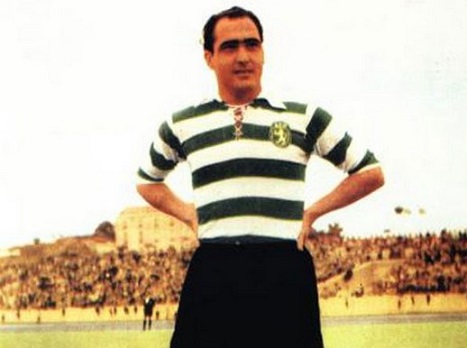 However, any ascendency gained often reflected the strength of the teams in a given era, with Sporting enjoying the upper hand over their neighbours in their heyday in the 1940s and 1950s, winning 18 and losing just 6 games from 1945-1954.
However, any ascendency gained often reflected the strength of the teams in a given era, with Sporting enjoying the upper hand over their neighbours in their heyday in the 1940s and 1950s, winning 18 and losing just 6 games from 1945-1954.
The success of the Lions for much of that golden era was down to prolific striker Fernando Peyroteo (pictured, left), who remains the top scorer in the fixture with an astonishing 48 goals in 45 Sporting versus Benfica fixtures.
His greatest moment of glory came on 25 April 1948 when Sporting needed to beat Benfica away by three clear goals to become national champions. Despite being ill with fever on the eve of the game, Peyroteo played and struck four goals as the Green and Whites ran out 4-1 winners to win the league.
Benfica dominate in the 1960s and 1970s
No prizes for guessing the second top scorer in the fixture, who was none other than Eusébio, the greatest Portuguese footballer in history until the emergence of Cristiano Ronaldo early this century.
Like Peyroteo, the “Black Panther” also scored at a remarkable rate of practically a goal a game in the Lisbon derby. He hit the back of the net 27 times in 29 matches between the two teams.
Eusébio fuelled Benfica’s glory years in the 1960s when the Eagles won back-to-back European Cups and reached the final five times in the decade. The Mozambique-born goal machine played practically his entire career at Benfica, only leaving the Portuguese capital in 1975, and this golden era for the Reds is also reflected in the Lisbon derby statistics.
From 1963 to 1974 Benfica won 16 of 29 derbies, with the Lions only coming out on top six times during this run.
In recent decades it has been much more evenly matched as regards the triumphant team, as FC Porto became the dominant force in Portuguese football for much of that time.
Passion
Nevertheless, even accounting for the intense rivalry between north and south whenever Porto play one of the Lisbon clubs, it has not diminished the depth of passion on display every time the Eagles face the Lions.
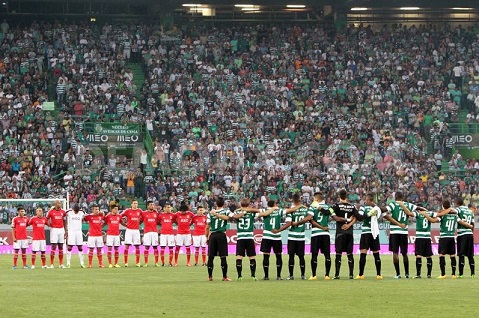 The fixture often splits friends and families in the city down the middle, but there is little sign of fraternity in the lead-up to the matches. A tradition that accompanies every game is the march of the away supporters to the “enemy territory”, accompanied by a police escort, as they walk the distance of approximately three kilometres that separates the two stadiums.
The fixture often splits friends and families in the city down the middle, but there is little sign of fraternity in the lead-up to the matches. A tradition that accompanies every game is the march of the away supporters to the “enemy territory”, accompanied by a police escort, as they walk the distance of approximately three kilometres that separates the two stadiums.
The contrasting colours, the chants, the history and the importance of the match in terms of who will end the season with silverware ensures that the Lisbon matchup will always be one of football’s major local derbies, alongside other intense city rivalries in great football cities such as Milan, Liverpool and Buenos Aires.
Portuguese football fans are keenly awaiting the next instalment in just two weeks’ time, when capacity crowds of over 65,000 and 50,000 frenetic fans will fill the Estádio da Luz and the Estádio José Alvalade for matches that will once again hold the residents of the Portuguese capital and beyond in thrall.


